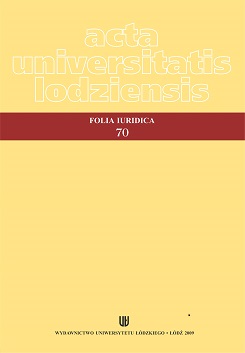Senat Rzeczypospolitej Polskiej i Senat Republiki Czeskiej. Analiza porównawczo-prawna
SENATE OF THE REPUBLIC OF POLAND AND SENATE OF THE CZECH REPUBLIC LEGAL AND COMPARATIVE ANALYSIS
Author(s): Krzysztof SkotnickiSubject(s): Politics / Political Sciences, Law, Constitution, Jurisprudence, Constitutional Law, Governance, Government/Political systems
Published by: Wydawnictwo Uniwersytetu Łódzkiego
Summary/Abstract: Creation of the second Chambers of Parliament in Poland and in the Czech Republic wasn’t the result of well-thought vision of these organs, but was made to deal with immediate problems. Their constitutional model is different. In Poland it’s term is connected with Sejm’s term whereas in the Czech Republic there is no connection between them. In Poland it lasts 4 years and in the Czech Republic 6 years and it can’t be dissolved. Moreover, the frame of Czech’s Senate is renewed in 1/3 of it’s frame every 2 years, which makes it more representative. Candidates for senators besides the traditional requirements such as citizenship, full active capacity and full public rights, have to be at least: 30 years old in Poland and 40 in the Czech Republic at the day of poll. There are majority elections, but in Poland constituencies are plurinominal (from 2 to 4), whereas in the Republic of Czech uninominal. In Poland the candidate with the highest number of votes gets the mandate whereas in the Czech Republic there is the requirement of the absolute majority of votes which is why the second round takes place that often. Both Senates work permanently but the Czech one may be put on hold. In both countries the model of asimetrical bicameralism was introduced. Second Chambers take part mainly in the legislative procedure but the main role is being played by the first Chambers. The most important right of the Senate of the Czech Republic is the possibility to create (when the Chamber of Parlament is dissolved) the decree-law. The creative competences of both Chambers are very random and it’s hard to find any particular idea in it. Similar situation takes place when we discuss other rights even though there is not many of them. Generally speaking, Czech construction seems to let the Senate run it’s duties in a better way. Disconnection of the Chamber’s commision and temporary ability to renew the frame of Senate are these ideas which should be taken into account when discussing the reform of the second Chamber.
Journal: Acta Universitatis Lodziensis. Folia Iuridica
- Issue Year: 2009
- Issue No: 70
- Page Range: 103-122
- Page Count: 20
- Language: Polish

